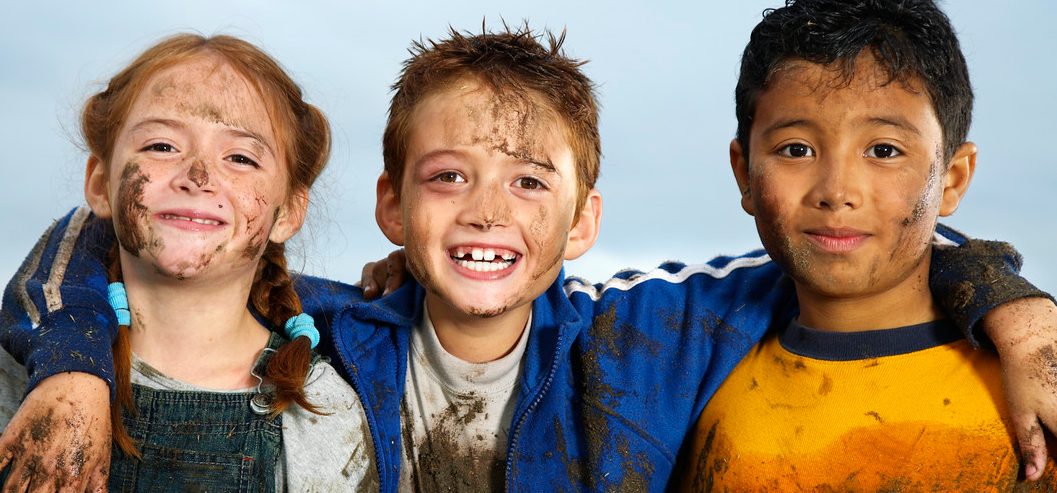How to Build Your Child's Immune System

Our battle with germs may have gone too far. Some science suggests that you’re not helping when you run after your child with anti-bacterial wipes.
You know how kids are — they want to explore the world with their tongues. They’ll happily lick a shovel, nuzzle a hamster, gobble a cookie on the floor, or put soil in their mouths. Some science suggests that, despite your good intentions, you’re not helping when you instruct them to limit what they kiss or run after them with anti-bacterial wipes. Dirt contains bacteria, viruses, and worms — and your kids’ instinct to get close to them may have evolved for a good reason.
Farmers focused on sustainable farms know the importance of the delicate balance of microbes in their soil. In fact, there are more microbes in a teaspoon of soil than there are people on earth. Human bodies also contain trillions of microbes, vastly outnumbering our own cells. Most of them are good, and the overall balance counts.
YOU MIGHT ALSO LIKE: Our Children and Teen Care section
A growing body of data suggests that from our time in the womb, in infancy, and beyond, exposure to microbiota shapes our immune systems. Your history is most important in determining your resistance to disease. As microbiologist and immunologist Mary Ruebush, author of “Why Dirt is Good: Five Ways to Make Germs Your Friends,” puts it, “The immune system is like an athlete: To become strong and adept, it needs training and practice. Hyper-sanitized environments deny it that opportunity and keep it sedentary and out of shape.”
Genes count, but they aren’t the main act. When Stanford microbiologist and immunologist Mark Davis PhD, and collaborators compared blood samples from identical twins to the same samples from fraternal twins, analyzing measures of immunity, they found that exposure to microbes along with other influences like vaccinations, diet, and dental hygiene were more important than genes. This was even more true for twins age 60 and up than those under the age of 20.
Davis is investigating how the immune system works. His team has studied a group of cells in the blood — CD4 T-cells — that act like assassins looking for dangerous visitors. Some recognize particular pathogens they’ve encountered before and can act against them within hours — instead of the days or weeks it might take if the danger wasn’t identified immediately. But some cells recognize pathogens even if the person hasn’t been previously infected by them, his team found. Importantly, newborns don’t have these cells. It may be that exposure to similar pathogens helps.
Cleanliness can be overdone. The “hygiene hypothesis” — that too much hygiene has caused new troubles — is based on observations among large populations. In the richer countries around the world, great progress has been made to decontaminate water and food, protect children with vaccination, and treat infections with antibiotics. In countries that haven’t widely adopted germ-killing practices, people are chronically infected by parasites in dirt — but rarely suffer from allergies and other immune disorders.
More sanitary countries, on the other hand, have seen surges in childhood asthma, infammatory bowel disease, and type 1 diabetes. In these conditions the immune system overreacts to non-threats — possibly because it’s not otherwise occupied fighting real dangers, many argue.
As Ruebush explains, “An idle immune system breeds allergies.” Younger children in large families, who tend to be on the receiving end of their siblings’ germs, are less likely to have hay fever. Living on a farm in Western Europe, or having many pets — and thus being exposed to animal microbes — seems to help prevent asthma. Beyond allergies, scientists have been exploring the role of a lack of exposure to parasites in autoimmune illnesses. Increasing evidence suggests that being infected with a parasite may actually protect you from diabetes, multiple sclerosis, inflammatory bowel disease, and rheumatoid arthritis, as well as allergic asthma.
Ruebush recommends skipping anti-bacterial cleaning products and letting minor illnesses run their course without antibiotics. And letting your kids kiss the dog might be just fine.
YOU MIGHT ALSO LIKE: Our Asthma, Allergies, and COPD Care section
Updated:
February 28, 2022
Reviewed By:
Janet O’Dell, RN